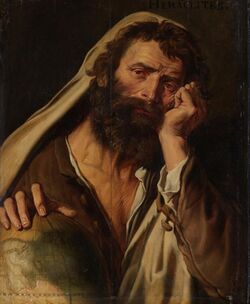Philosophy:On Nature (Heraclitus)
 Heraclitus by Abraham Janssens, c. 1601 | |
| Author | Heraclitus |
|---|---|
| Language | Greek |
| Genre | Philosophy |
| Published | c. 500 BC |
On Nature (Greek: Περὶ Φύσεως; Peri Physeos) is a philosophical treatise written by Heraclitus. According to Diogenes Laërtius, it was divided into three discourses; one on the universe, another on politics (and ethics), and one on theology. Theophrastus says (in Diogenes) "... some parts of his work are half-finished, while other parts make a strange medley."[1] The original title is unknown.[2]
Diogenes also tells us that Heraclitus deposited his book, inscribed on a single papyrus roll, as a dedication in the great temple of Artemis, the Artemisium, at Ephesus, one of the largest temples of the 6th century BCE and one of the Seven Wonders of the Ancient World. Ancient temples were regularly used for storing treasures, and were open to private individuals under exceptional circumstances; furthermore, many subsequent philosophers in this period refer to the work. Classicist Charles H. Kahn says: "Down to the time of Plutarch and Clement, if not later, the little book of Heraclitus was available in its original form to any reader who chose to seek it out."[3] Diogenes says: "the book acquired such fame that it produced partisans of his philosophy who were called Heracliteans."[4]
As with other pre-Socratics, his writings only survive in fragments quoted by other authors. The first lines of the book are known through such quotations. Aristotle quotes a passage from the beginning in Rhetoric to illustrate the hardship of punctuating Heraclitus without ambiguity; he debated whether "forever" applied to "being" or to "prove".[5][6] In Against the Mathematicians, Sextus Empiricus provides a quote of the entire passage:
Of this Logos being forever do men prove to be uncomprehending, both before they hear and once they have heard it. For, though all things come to pass in accordance with this Logos, they are like the unexperienced experiencing words and deeds such as I explain when I distinguish each thing according to its nature and show how it is. Other men are unaware of what they do when they are awake just as they are forgetful of what they do when they are asleep.[7]
In the 2nd century, the Christian Church Father Hippolytus of Rome provided one of the most extensive sources of passages from On Nature with his polemical compendium Refutation of All Heresies. One of the quotations includes:
God (theos) is day and night, winter and summer, war and peace, surfeit and hunger; but he takes various shapes, just as fire, when it is mingled with spices, is named according to the savor of each.[8]
Martin Heidegger believed that the thinking of Heraclitus (and Parmenides) was the origin of philosophy and misunderstood by Plato and Aristotle, leading all of Western philosophy astray.[9] Heidegger quotes from passages of On Nature throughout his published lecture course Introduction to Metaphysics, relating the logos of Heraclitus to that of the Christian tradition and comparing Greek philosophy to Christianity as a whole:
Heraclitus's teaching on logos is taken as a predecessor of the logos mentioned in the New Testament, in the prologue to the Gospel of John. The logos is Christ. Now, since Heraclitus already speaks of the logos, the Greeks arrived at the very doorstep of absolute truth, namely, the revealed truth of Christianity.[10]
Notes
- ↑ Diogenes Laërtius, ix. 6
- ↑ Burnet, John (1930). Early Greek Philosophy. 4, 5 & 6 Soho Square, London, W.1: A. & C. Black, Ltd.. pp. 131.
- ↑ Kahn, Charles (1979). The Art and Thought of Heraclitus: Fragments with Translation and Commentary. London: Cambridge University Press. pp. 1–23. ISBN 0-521-28645-X.
- ↑ Diogenes Laërtius, ix. 6
- ↑ Graham, Daniel W. (April 27, 2021). Zalta, Edward N.. ed. The Stanford Encyclopedia of Philosophy. Metaphysics Research Lab, Stanford University. https://plato.stanford.edu/archives/sum2021/entries/heraclitus/.
- ↑ Rhetoric 3.1407b11
- ↑ DK B1, from Sextus Empiricus, Against the Mathematicians 7.132
- ↑ DK B67, from Hippolytus, Refutation of All Heresies 9.10.8
- ↑ W. Julian Korab-Karpowicz, The Presocratics in the Thought of Martin Heidegger (Frankfurt am Main: Peter Lang, 2016), page 58.
- ↑ Heidegger, Martin (2014). Introduction to Metaphysics, Second Edition. New Haven & London: Yale University Press. ISBN 978-0-300-18612-3.

